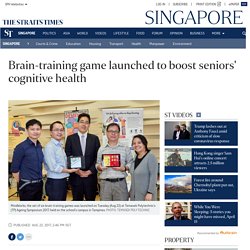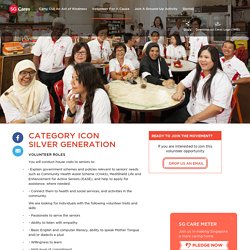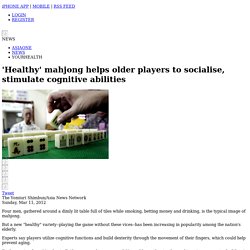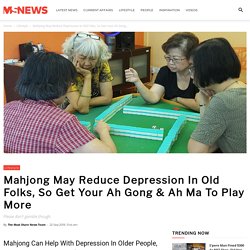

This implies that there are 18 seniors aged 65 years and older per working-age population (15-64 years).
The increase in Singapore’s average life expectancy is a double-edged sword. Old age is commonly accompanied by deteriorating health, which may affect the elderly’s ability to participate in social activities. The elderly may have also outlived their spouses, friends or children, and may not have enough retirement funds for personal use. Indeed, this may account for the increase in elderly suicide rates, with 36% of the 361 suicides in 2017 as compared to 29% of the 429 suicides in 2016.
Why engaging old folk socially is important , Opinion News. Brain-training game launched to boost seniors' cognitive health, Singapore News. SINGAPORE - A set of mobile-phone games has been created to help boost the cognitive health of seniors.

The Android games are memory-based and target people above the age of 50. They incorporate basic matching, counting and sequencing skills, with a time limit of two minutes. Called MindWorks, the set of six brain training games was launched on Tuesday (Aug 22) at Temasek Polytechnic's (TP) Ageing Symposium 2017, held on the school's campus in Tampines. Bearing the theme, "Towards Successful Ageing", the symposium focused on three key aspects of a person: physical (exercise), cognitive (brain training) and socio-emotional (mindfulness).
Researchers and students from the polytechnic teamed up with neuroscientist Ryuta Kawashima from Japan's Tohoku University to create the games to challenge an ageing brain. Professor Kawashima served as the team's adviser, and would fly in at least twice a year to check the status of the games' development. Volunteer For A Cause. You will conduct house visits to seniors to: - - Explain government schemes and policies relevant to seniors’ needs such as Community Health Assist Scheme (CHAS), MediShield Life and Enhancement for Active Seniors (EASE), and help to apply for assistance, where needed. - - Connect them to health and social services, and activities in the community.

We are looking for individuals with the following volunteer traits and skills: - - Passionate to serve the seniors. 'Healthy' mahjong helps older players to socialise, stimulate cognitive abilities. The Yomiuri Shimbun/Asia News Network Sunday, Mar 11, 2012 Four men, gathered around a dimly lit table full of tiles while smoking, betting money and drinking, is the typical image of mahjong.

But a new "healthy" variety--playing the game without these vices--has been increasing in popularity among the nation's elderly. Experts say players utilize cognitive functions and build dexterity through the movement of their fingers, which could help prevent aging. Each morning from Monday to Friday, men and women aged 60 or older gather to play mahjong in a room at a building in Shinagawa Ward, Tokyo. "Ron! " It is a fun event with players enjoying themselves irrespective of whether they win or lose. These players are members of "Ikiiki Kenko Majan Hiroba" (a plaza for lively, healthy mahjong), which was started by the ward government in 2002 to provide elderly people with a new lease on life. In fiscal 2011, about three-quarters of the participants in the Shinagawa event were women. Mahjong May Reduce Depression In Old Folks, So Get Your Ah Gong & Ah Ma To Play More.
It’s a Saturday, you’ve had an exhausting week, and all you want to do is sleep till lunchtime.

But suddenly, you hear from downstairs that familiar, noisy shuffling of tiles. Your old folks are at it again, and you wonder what benefits Mahjong brings. But hear, hear — a study published by the journal Social Science and Medicine reported that playing Mahjong may help older people deal with depression or even keep it at bay.
So push back your frustrations, because that ruckus is going a long way in preserving ah gong and ah ma’s healthy mental state. Source Mahjong stimulates the mind Conducted in China, the study found that for the elderly living in urban areas, Mahjong was particularly helpful in lowering the rates of depression.